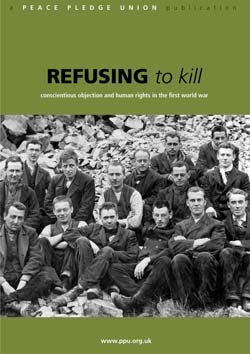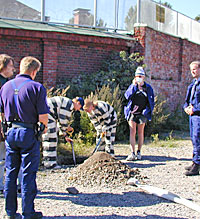|
In the news Information about conscientious objection |
CONSCIENTIOUS OBJECTION TODAY ARMENIA Even with the new law, which allows for alternative service for those whose claim to be conscientious objectors is accepted, arrests for ‘draft-dodging’ were still being made, and many who were already in prison had not been freed. ERITREA Amnesty International reported in November 2004 that since 1998 the Eritrean military had been rounding up and arresting thousands of young men and others suspected of evading military conscription. These arrests had recently been stepped up. Many young men and women have fled from the country as refugees in order to avoid conscription. ‘Soldiers go into offices, houses, stop cars, taxis, buses, and ask for identity cards,’ said one young man. The report described how some people recently arrested were now in an army prison. Conditions there were harsh, with severe overcrowding, not much food and little sanitation. Some, it was said, had been forced to sleep outside in very cold weather without blankets or shoes. Prisoners had no access either to their families or to lawyers. There were also reports that the army has used severe physical punishment to force objectors, including some Jehovah's Witnesses, to perform military service. In some instances, authorities were said to have arrested or detained (for hours or even days) a number of people, including pregnant women, children under 18, and citizens of other countries – even though they were not liable for call-up, and even if they had documents proving they had already done military service or were exempt from it.
GERMANY In 2003 two ‘total objectors’ (people who refuse not only compulsory military service but also the alternative service which is also run by the military) were arrested: they had been called up, and though they dutifully turned up at their barracks they refused to obey any military orders. The usual fate of German total objectors has been to spend up to about 3 months under military arrest. Then they are tried for criminal disobedience in civilian law courts. GREECE The case of one conscientious objector caused War Resisters International to launch a campaign to support him. He first declared himself a CO in 1992. In the following years he was imprisoned 3 times and taken to court 12 times. In 1998 he applied for status as a CO under the new 1997 law, but though he was accepted he was also called up for alternative service – for a term over 7 times longer than his military service would have been. He refused to do alternative service. In 1999 he was arrested again and sentenced to 4 years in prison. He appealed against the sentence, which was eventually suspended. But then he was called up again! At the end of 2004 he was once more arrested, tried and sentenced to two and a half years in prison. Campaigners point out that he had now been tried and punished twice for the same ‘offence’, and should be released. ISRAEL Israel’s ‘refuseniks’ – soldiers who have refused to obey orders to harass or kill Palestinian civilians – have become famous. In recent years a few have managed to get exemption from military service. They had to succeed in convincing the military authorities that they were pacifists. In the case of women, Israel’s conscription law allows exemption to those who are pacifists or who have a strict ‘religious family lifestyle’. But in practice being a pacifist (but not committed to a religious life) has not been enough for the military courts to agree to grant exemption. At the end of 2004 the legal rights of women COs were still unclear and uncertain. The problem, however, is finding alternative service jobs for them to do. Some have been doing welfare work (in nursing homes, for example). But others have been sent to military construction sites and factories, which is not civilian service. SERBIA & MONTENEGRO It was reported that over 12,000 young men applied for CO status after alternative service became an option. Over 6,000 were in alternative service posts by the end of 2004. SOUTH KOREA Meanwhile COs continued to be arrested and imprisoned. Some object to call-up because of their Buddhist religion. Some have objected in particular to the deployment of South Korean troops in Iraq. Yet others are pacifists, and some of these are active protesters in the pacifist cause, working with organisations such as World Without War and Amnesty International, or in liberal political groups, or through publications and the press. Some have protested by going on hunger strike. One conscript who declared his conscientious objection to taking part in the war in Iraq was arrested at the end of 2003. His defence was that the South Korean constitution banned wars of aggression. The judge told him that the USA was friendly towards South Korea and therefore must be supported in every way. The CO was sentenced to 2 years in prison, later shortened by 6 months. SWITZERLAND A law on conscientious objection was passed in 1992, but allows very few reasons for claiming conscientious objection. This has meant that some COs have not even applied for CO status, but have found other ways out. There have been reports of successful evasion of military service for medical or other reasons. Some men have obtained dismissal from military training. One objector declared himself a CO in 1996, but his application for alternative service was turned down and he was called up in 1999. He refused to serve and was sentenced to 5 months in prison. Here the conditions in which he was kept grew steadily worse. It was claimed that he was a security threat. His windows were sealed, he was refused contact with any other prisoners, his mail was kept from him, and visits were rarely allowed – and then only to people vetted by the prison authorities. The prison manager said that this was to prevent publicity. The CO began a hunger strike in protest. TURKEY One particular conscientious objector was arrested in 1996, charged with disobeying orders. He spent 2 and a half years in prison. Here he met another prisoner. This man had been imprisoned for serious crime and facing a likely life sentence; he was also a supporter of fascism and contemptuous of conscientious objection. But gradually the two men began to talk. The CO (whose case was accepted in 2004 for examination by the European Court of Human Rights) remembers: ‘Although our thoughts were in conflict, he began to respect me, followed by a kind of friendship. He tried more and more to understand my principles. We began to discuss ethics, religion, history, nationalism, psychology and so on.’ When the now ex-fascist was released under an amnesty in 2002, he too declared himself to be a conscientious objector.
|
|||

Text extract from Voices for Peace interactive CD |
USA One young Costa Rican had settled in Florida when he was 18. Like many of the USA’s more disadvantaged citizens, he joined the army because it promised him education at university. He was in his last year of study when his unit was activated and sent to Iraq. He was deeply troubled by his experience there. ‘When I saw with my own eyes what war can do to people, a real change took place within me. My experience of war has changed me. I learned that the fear of dying has the power to turn soldiers into real killing machines. In a combat environment it becomes almost impossible to consider things like acting strictly in self-defence. My feelings about the war dictated that I could no longer be a part of it. By putting my weapon down I chose to reassert myself as a human being.’ He did not return to Iraq after being allowed home on leave. He was later charged with desertion, deprived of army pay, and sentenced to a year in prison. |
|||


